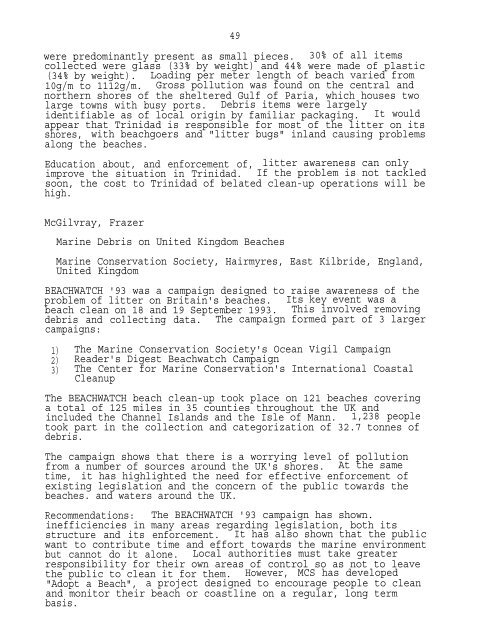Poster abstracts and manuscripts from the Third International ...
Poster abstracts and manuscripts from the Third International ...
Poster abstracts and manuscripts from the Third International ...
Create successful ePaper yourself
Turn your PDF publications into a flip-book with our unique Google optimized e-Paper software.
49<br />
were predominantly present as small pieces. 30% of all items<br />
collected were glass (33% by weight) <strong>and</strong> 44% were made of plastic<br />
(34% by weight). Loading per meter length of beach varied <strong>from</strong><br />
10g/m to 1112g/m. Gross pollution was found on <strong>the</strong> central <strong>and</strong><br />
nor<strong>the</strong>rn shores of <strong>the</strong> sheltered Gulf of Paria, which houses two<br />
large towns with busy ports. Debris items were largely<br />
identifiable as of local origin by familiar packaging. It would<br />
appear that Trinidad is responsible for most of <strong>the</strong> litter on its<br />
shores, with beachgoers <strong>and</strong> "litter bugs" inl<strong>and</strong> causing problems<br />
along <strong>the</strong> beaches.<br />
Education about, <strong>and</strong> enforcement of, litter awareness can only<br />
improve <strong>the</strong> situation in Trinidad. If <strong>the</strong> problem is not tackled<br />
soon, <strong>the</strong> cost to Trinidad of belated clean-up operations will be<br />
high.<br />
McGilvray, Frazer<br />
Marine Debris on United Kingdom Beaches<br />
Marine Conservation Society, Hairmyres, East Kilbride, Engl<strong>and</strong>,<br />
United Kingdom<br />
BEACHWATCH '93 was a campaign designed to raise awareness of <strong>the</strong><br />
problem of litter on Britain's beaches. Its key event was a<br />
beach clean on 18 <strong>and</strong> 19 September 1993. This involved removing<br />
debris <strong>and</strong> collecting data. The campaign formed part of 3 larger<br />
campaigns:<br />
1) The Marine Conservation Society's Ocean Vigil Campaign<br />
2) Reader's Digest Beachwatch Campaign<br />
3) The Center for Marine Conservation's <strong>International</strong> Coastal<br />
Cleanup<br />
The BEACHWATCH beach clean-up took place on 121 beaches covering<br />
a total of 125 miles in 35 counties throughout <strong>the</strong> UK <strong>and</strong><br />
included <strong>the</strong> Channel Isl<strong>and</strong>s <strong>and</strong> <strong>the</strong> Isle of Mann. 1,238 people<br />
took part in <strong>the</strong> collection <strong>and</strong> categorization of 32.7 tonnes of<br />
debris.<br />
The campaign shows that <strong>the</strong>re is a worrying level of pollution<br />
<strong>from</strong> a number of sources around <strong>the</strong> UK's shores. At <strong>the</strong> same<br />
time, it has highlighted <strong>the</strong> need for effective enforcement of<br />
existing legislation <strong>and</strong> <strong>the</strong> concern of <strong>the</strong> public towards <strong>the</strong><br />
beaches. <strong>and</strong> waters around <strong>the</strong> UK.<br />
Recommendations: The BEACHWATCH '93 campaign has shown.<br />
inefficiencies in many areas regarding legislation, both its<br />
structure <strong>and</strong> its enforcement. It has also shown that <strong>the</strong> public<br />
want to contribute time <strong>and</strong> effort towards <strong>the</strong> marine environment<br />
but cannot do it alone. Local authorities must take greater<br />
responsibility for <strong>the</strong>ir own areas of control so as not to leave<br />
<strong>the</strong> public to clean it for <strong>the</strong>m. However, MCS has developed<br />
"Adopt a Beach", a project designed to encourage people to clean<br />
<strong>and</strong> monitor <strong>the</strong>ir beach or coastline on a regular, long term<br />
basis.
















